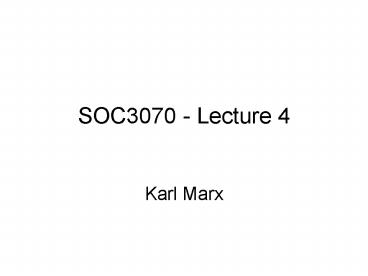SOC3070 - Lecture 4 - PowerPoint PPT Presentation
1 / 18
Title:
SOC3070 - Lecture 4
Description:
But, historically, the division of labour occurs always in a context of structured inequality. ... Division of labour as the source of both individuality and ... – PowerPoint PPT presentation
Number of Views:15
Avg rating:3.0/5.0
Title: SOC3070 - Lecture 4
1
SOC3070 - Lecture 4
- Karl Marx
2
Last week
- Durkheim on history as a social process largely
independent of the individuals who enact it. - Forced division of labour as abnormal.
- But, historically, the division of labour
occurs always in a context of structured
inequality.
3
Karl Marx, Friedrich Engels
- Describe well the two-sidedness of history.
- Men make their own history, but they do not make
it just as they please they do not make it under
circumstances chosen by themselves, but under
circumstances directly encountered, given and
transmitted from the past. - The Eighteenth Brumaire
4
- History is made by the action of individuals in
pursuit of their intentions. - But individual action has almost invariably
unintended consequences - Task to understand the relationship between
human intentions and their historical outcome
5
Historical Materialism
- Methodology, type of analysis that relates
present action to the structures of the past - Historical all human societies are embedded in
their past - Materialism the processes and relationships of
production are essential to the creation of all
human societies
6
- Engels
- The production of the means to support human
life is the basis of all social structure - Division of labour as key process.
- At its core is not interdependence, but
inequality
7
- In production men not only act on nature but
also on one another. In order to produce they
enter into definite connections and relations
with one another, and only within these social
connections and relations does their action on
nature take place. - Forces of production / Relations of
production - A mode of production is the economic
structure of society. Which is also a mode of
power (classes).
8
The materialistic conception of history
- Marx, 1859
- In the social production of their life men
enter into definite relations that are
indispensable and independent of their will - ? The priority of society
9
- relations of production which correspond to a
definite stage of development of their material
productive forces. The sum total of these
relations of production constitutes the economic
structure of society, the real foundation on
which rises legal and political superstructure
and to which correspond definite forms of social
consciousness. - ? the material basis of social organisation
10
- The mode of production of material life
conditions the social, political, and
intellectual life process in general. - ? economic production and social organisation
11
- It is not the consciousness of men that
determines their being but, on the contrary,
their social being that determines their
consciousness. - ? the shaping of consciousness
12
- At a certain stage in their development, the
material productive forces of society come into
conflict with the existing relations of
production i.e. with the property relations
within which they have been at work hitherto. - ? the source of social change
13
- From forms of development of the productive
forces these relations turn into their fetters - The nature of social change
- Thus begin the epoch of social revolution
14
- With the change of the economic foundation,
the entire immense superstructure is more or less
rapidly transformed - the economic sources of social change
- end quote
15
- Marxism as a form of historical sociology
- Two-sided interaction of action and structure
through time - Division of labour as the source of both
individuality and inequality - Contradictions between forces of
production/relations of production hardens into
systems of class relationships - Class domination legitimates itself through
religion, philosophy, law, and the state
16
- Main empirical test the historical transition
from feudalism to capitalism - Two kinds of historical writings
- Methodology
- Marx-Engels, The German Ideology
- Marx Engels, The Communist Manifesto
- 2. Historical case-studies. They bring out in
detail the nature of the interaction of social
structure and individual action within a specific
historical setting - K. Marx, The Class Struggles in France
- K. Marx, The Eighteenth Brumaire of Louis
Bonaparte - F. Engels, The Peasant War in Germany
17
In these historical studies
- Three levels of analysis
- Events, subjective world of action
- Political structures, institutions, ideologies
- Class structure.
18
- Superstructures politics, philosophy, religion,
culture, etc??Economic situationHistory as
ultimately determined by economic relationships































